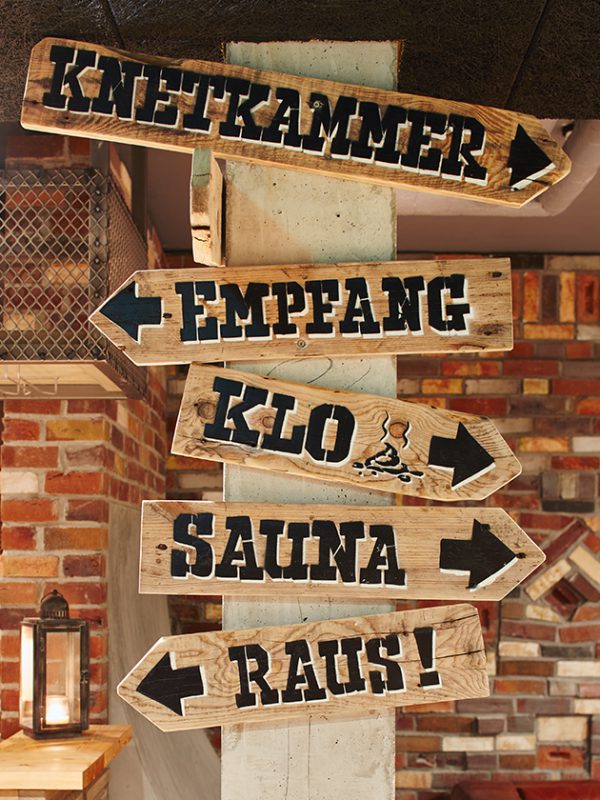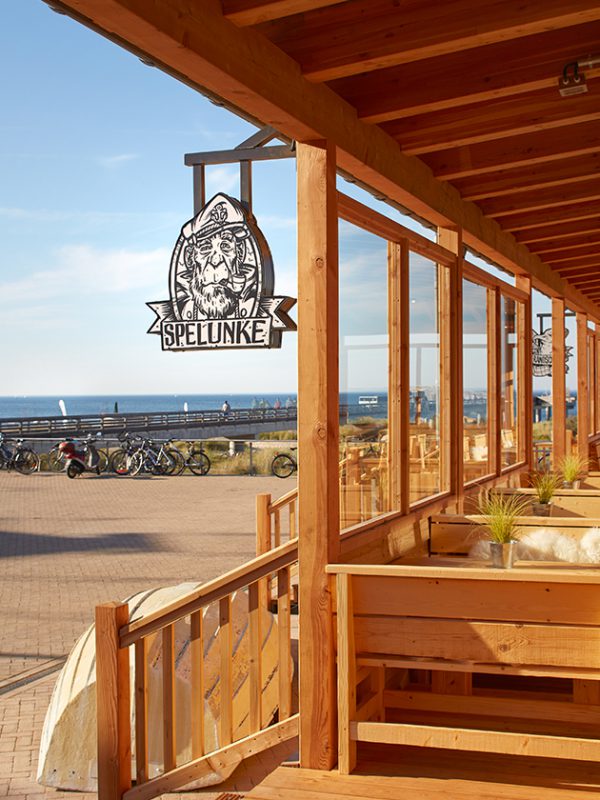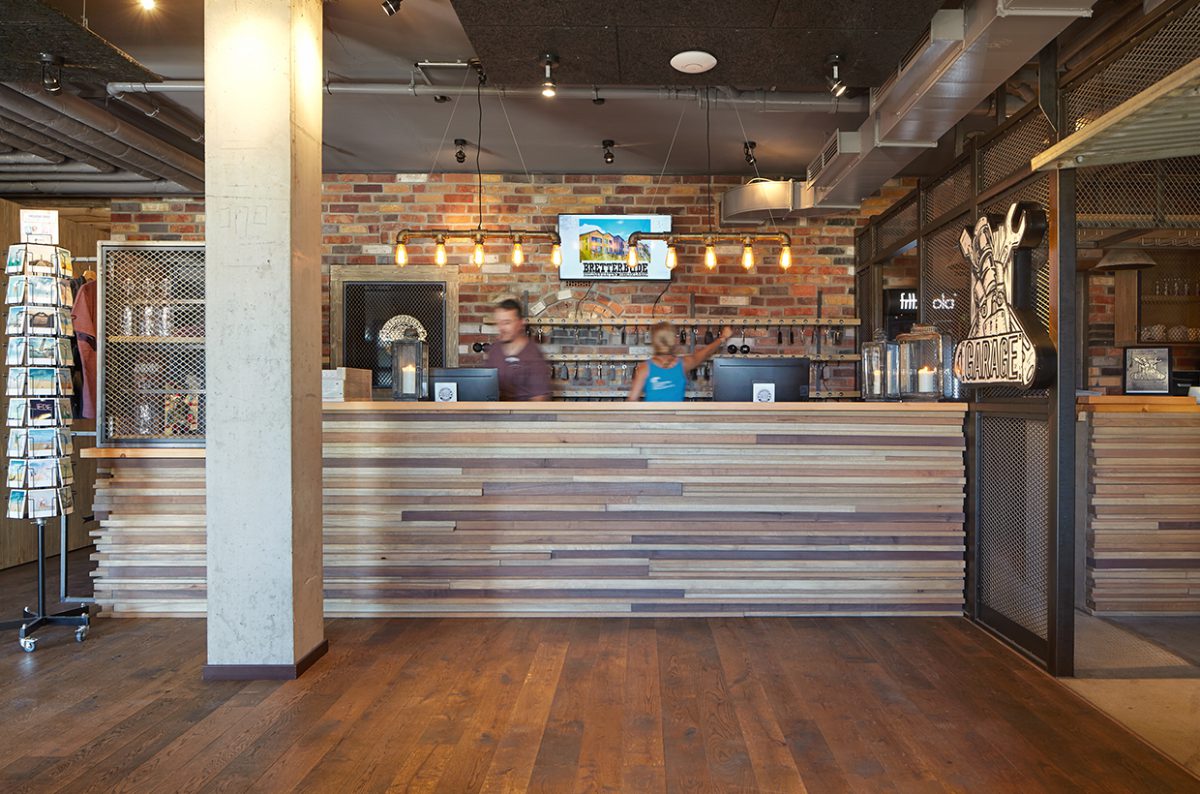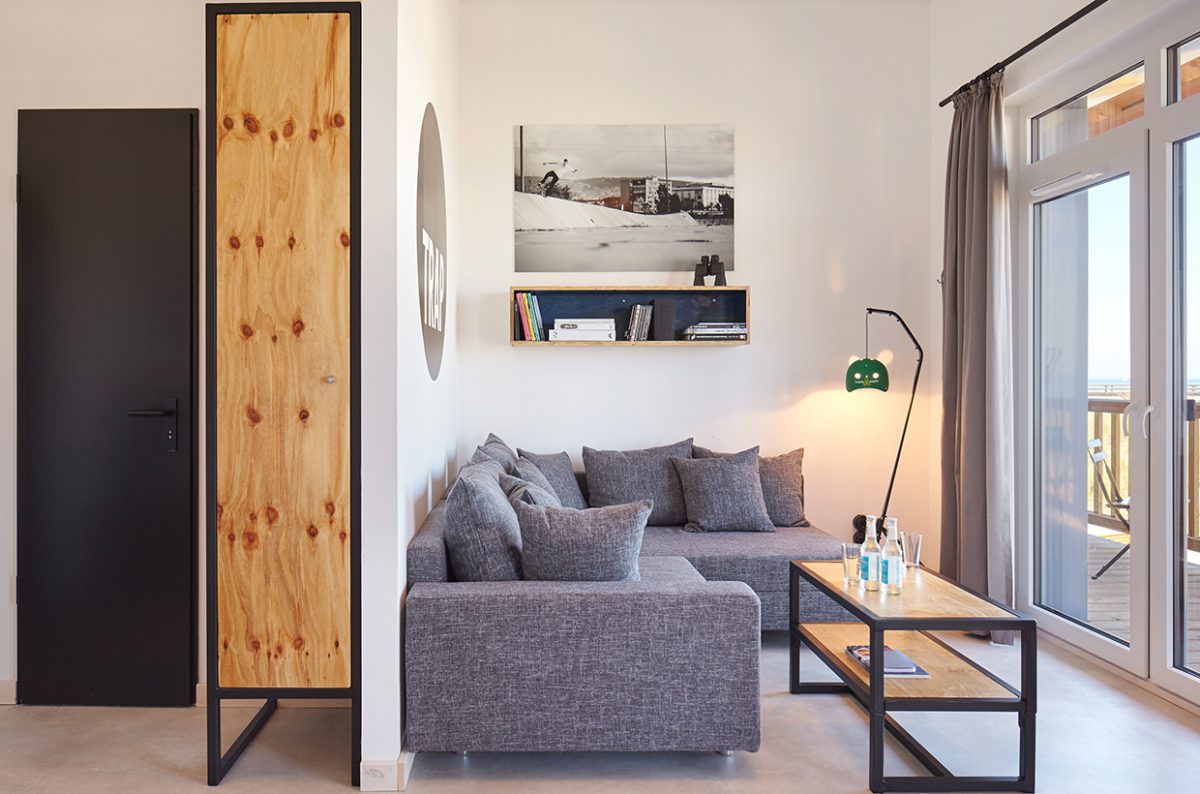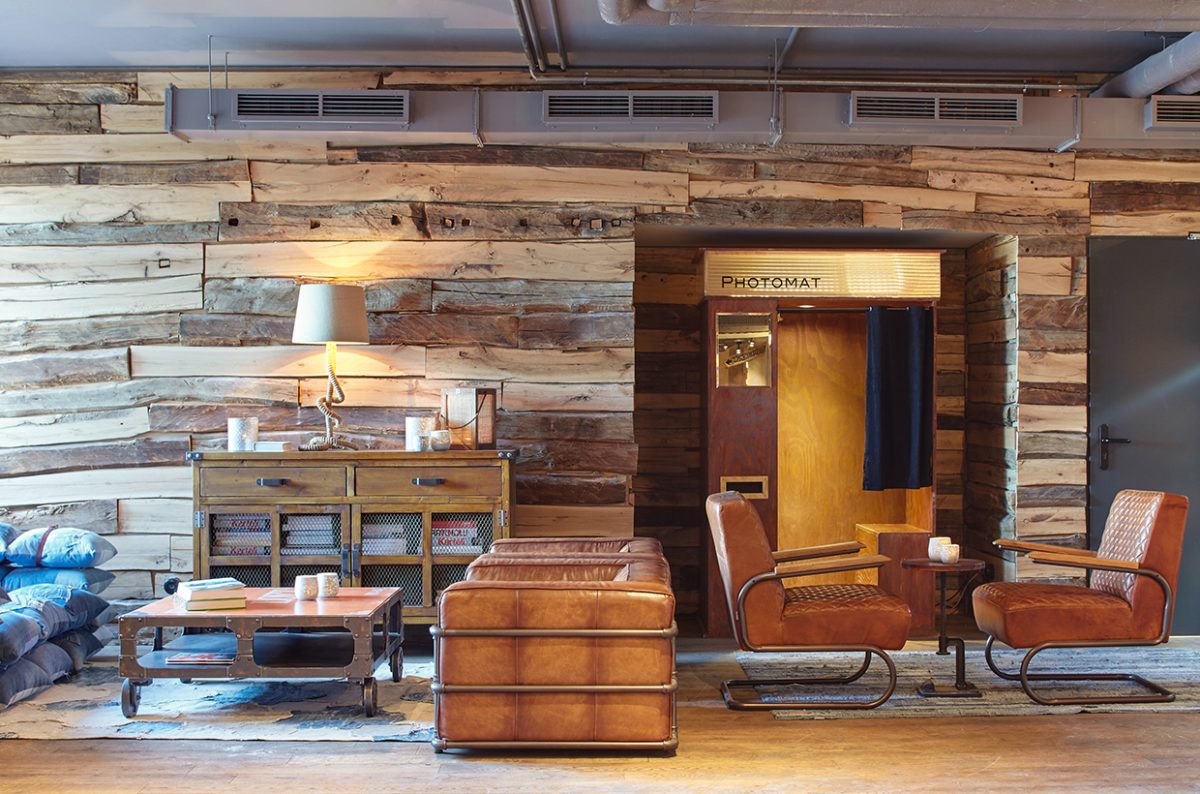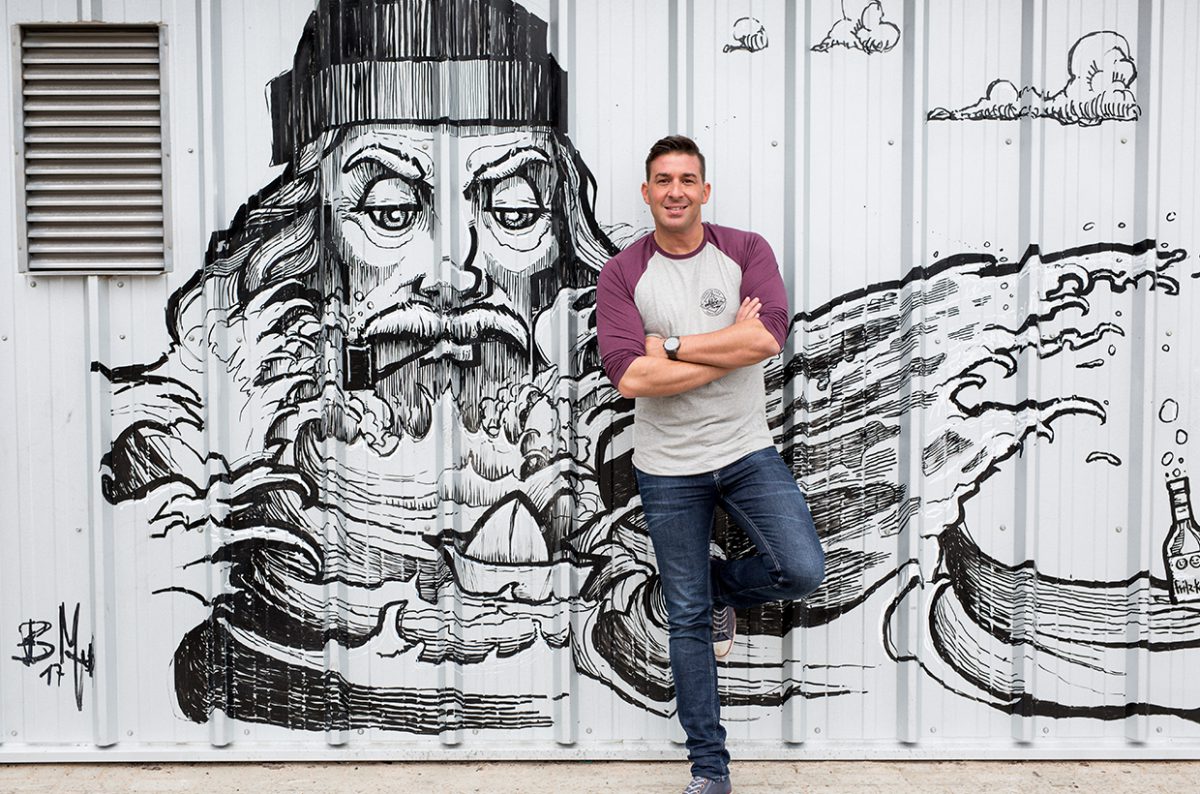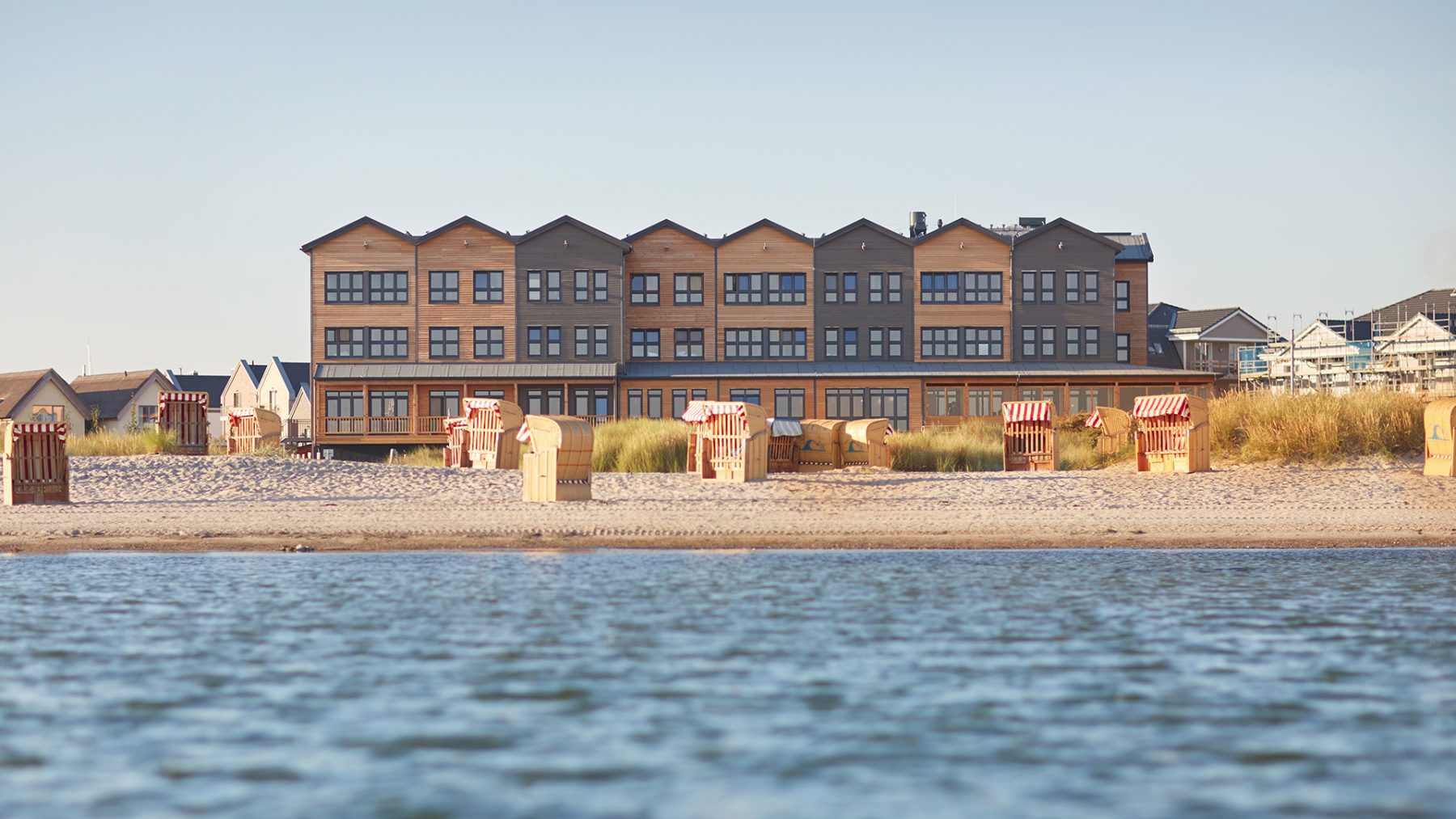Inspired by Simplicity by Henning Kober | 7th June, 2019 | Offices
The Bretterbude in the town of Heiligenhafen on the Fehmarn Sound offers its younger clientele uncomplicated and affordable accommodation. It is situated on the shoreline, right next to a peninsula populated by wild birds. Jens Sroka, who conceived the hotel, made his name with the Beach Motel in St. Peter-Ording. The pioneering entrepreneur gives new momentum to the hotel trade on both of Germany’s coasts.
Heading to Germany’s Baltic Sea coast turns out to be a pan-European experience. In Berlin, I board a Czech intercity train to Hamburg, where I transfer to a Danish train heading to Copenhagen. We pass through the city of Lübeck and a little later, I see the first flashes of light reflecting off the grayish- blue sea. After roughly an hour, we reach the city of Oldenburg in Holstein. From there, it is just a short bus ride to Heiligenhafen on the Fehmarn Sound – and a revelation. I walk past brick buildings towards the sea, the street leading me down a narrow strip of land to two sand spits. Jangling noises echo across from the marina. Straight ahead there is a pier, and to the right, a cluster of three-story houses in various wooden hues, which – on closer inspection – form a single development.
The Bretterbude [editor’s note: German for “wooden shack”] hotel is reminiscent of places on the U.S. East Coast: Maine, Montauk and Martha’s Vineyard. French ski resorts also spring to mind. Opened in late summer 2016, the establishment’s offer is simple and alluring: great design, beachfront location, affordable prices. At the reception in the basement everyone is on first name terms and the check-in formalities are quickly completed. I am handed a small fold-out map informing me of all the important landmarks. In one corner of the lobby, there are two kids on skateboards. The walls are unrendered, on a projection screen the movie Avatar is playing. Spacious leather sofas invite visitors to get comfortable. The bookshelves are full of high-end coffee table books.
“I wanted to attract a young clientele,” Jens Sroka explains later as we sit in the hotel restaurant called Strandschuppen [German for “beach shed”]. The 43-year-old entrepreneur comes from a family of hoteliers and has already celebrated a big success with his Beach Motel, which opened in the North Sea resort St. Peter-Ording about five years ago.
Now he has made his mark on Germany’s Baltic coast, having recognized the potential of Heiligenhafen early on. The property is in a prime location, right opposite the new pier built in 2012, which is why development of the site sparked local controversy. Sroka prevailed, however, and invested roughly €50 million in the construction of two adjacent hotels: the Bretterbude and a version of one of his tried-and-tested Beach Motels. “Each of my hotels starts off with an idea and a name from which a theme is developed,” he says. The Bretterbude was designed to cater to kite surfers, skateboarders and individualists. For those who are just passing through, there are also a dozen parking spots for camper vans. Showers and a drying room for wetsuits can be found in an additional building.
The L-shaped hotel boasts 180 beds in 81 smart but simple guest rooms. There are three room sizes, plus several spacious suites. The smallest of the en-suite rooms measures roughly 13 square meters. In them, the bed sits flush with a large window, which allows for great views of the Baltic Sea. Prices start from €39 a night during the off season, €89 during the summer. “Because of our themed nomenclature – we call our guests ‘Halunken’ [German for “rascals”], for example – you might think that we attract people that are a bit rough around the edges.” In fact, many older guests also patronize the hotel. “If a 70-year-old doesn’t have a problem with us calling them by their first name, and with the fact that we use the German word for ‘farmhand’ to refer to our employees, they are very welcome here,” Sroka says laughing. “On the weekends, there are expensive cars out there in the parking lot. Our guests like our image and want to be in the kind of environment we provide for them.”
Over the last two decades, the way many people in Germany travel has changed. Instead of one long vacation in the summer, people take several shorter breaks. This has also caused changes in other travel habits, Sroka says. “We have noticed that the crucial factor for guests isn’t how many stars a hotel may have, but what sort of lifestyle they experience there.” At the Bretterbude he has dispensed with daily visits from housekeeping – too expensive. They can, however, be added for extra charge. Alternatively, guests can do their own cleaning with the equipment provided on each floor. This system works. The self-service restaurant, however, did not go over well and has been consigned to history. “People on vacation don’t want to stand in line.” The sauna and steam room cost extra and you can get a massage for a fee. Children and groups are welcome at the hotel, as are dogs.
In its first year of operation, the Bretterbude was voted “Hotel of the Year” by the Hotel Forum in Munich – an annual top-level symposium that takes place during the Expo Real, Europe’s largest real estate trade fair. “It was funny. When we won that night, everyone started googling Heiligenhafen to find out where it is.”
“I saw the lobster fishing huts in Heligoland and knew I wanted my new hotel to look like that.” Jens Sroka
In the afternoon I take a walk along the seafront. At the end of the promenade, a path leads out to the long and narrow Graswarder Peninsula. I soon reach a barrier where a sign proclaims “Nature reserve – vehicular access prohibited.” The spit of land gets very narrow – less than 100 meters across. To the right, there are meadows, and behind them the sea and a fishing port. In the distance, the Fehmarn Sound Bridge stretches across the water. At the end of the path, there is another barrier that you are only allowed to cross in the summertime as part of a guided tour. The huge area behind it measures 230 hectares. A skein of gray geese flies past. Oystercatchers, wagtails and skylarks also live and breed on these salt marshes.
Jens Sroka himself lives in Hamburg and only goes to Heiligenhafen once a week. He trusts his hotel managers and is busy developing new ideas. He is also sounding out a possible project near Hamburg’s main railway station. In April, he opened the Fliegerdeich boutique hotel with only 13 guest rooms, on the North Sea coast near Wilhelmshaven. The Friesland Hotel, boasting 80 rooms and suites, is scheduled to be completed next year. This August, Sroka will be opening the Lighthouse Hotel & Spa, a 500-bed, four-star establishment in the city of Büsum. Sroka draws together all his establishments under the umbrella brand Heimathafen Hotels [German for “Homeport Hotels”]. If you include the new hotel in Büsum, he will soon be employing 500 people.
Sroka clearly enjoys discovering new locations, coming up with a theme and nailing down the details. The main idea for the Bretterbude hotel came to him during a camping trip, he says. “I was in Heligoland. When I saw the lobster fishing huts, I knew that was what I wanted my new hotel to look like.”
